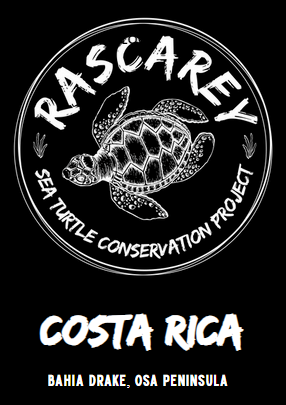Donate now to help endangered sea turtles in southwest Costa Rica! Your money will go directly to sponsoring a nest of Green, Leatherback, Hawksbill, or Olive Ridley eggs to be hatched and released this season!
RASCAREY (www.rascarey.com) was founded in 2020 by Esteban Perez Valdez in the remote Rincon San Josecito part of Osa Peninsula of southwest Costa Rica. Esteban is a Costa Rican who was born and raised in this area and has dedicated more than 15 years of his life to the protection of the four species of critically endangered different sea turtle species that roost there. RASCAREY's directly works to stop the local decline of sea turtle populations through direct action, including:
• Nightly beach patrols to search for nesting turtles in order to document locations and plan egg reconnaissance within four hours
• Monitoring and maintenance of turtle nursery where eggs are reared and hatched
• Release of baby turtles, including education and outreach opportunities
• Data collection for scientific purposes
• Weekly beach clean ups to remove plastic debris
• Planting and cultivation of local plants
• Educational activities to connect people to conservation efforts and sustainable living practices
Globally, turtles are facing numerous threats and worldwide decline; six of the seven sea turtle species are classified as threatened or endangered.
An example of the various dangers they face are:
*Poaching: sea turtles and their eggs are killed by people for food and for other products such as oil, leather and shell. They are also sold on the black market.
*Climate change: loss of nesting beaches due to sea level rise, and increase in nesting beach temperatures that negatively impacts the genetic diversity and alters gender of sea turtles
*Predators and domesticated animals eating the eggs
*Illegal beach vehicular activity that crushes the eggs
*Boat activity: hundreds of sea turtles are injured due to boat strikes every year
*Fisheries: incidental capture in fishing gear (bycatch)
*Pollution: adult and baby turtles get entangled in ghost nets & stuck in floating debris or ingest plastic bags as they are often mistaken for jellyfish
*Habitat destruction: habitats are degraded and destroyed by coastal development (on the shore, but also on the seafloor)
Your funds are critical at this time to help this project successfully rear the currently 80 nests that have been rescued to date! We will be working in the future to develop an exchange program for volunteers to participate in the rescue and hatching experience. Stay tuned, and thank you for your continued support!

